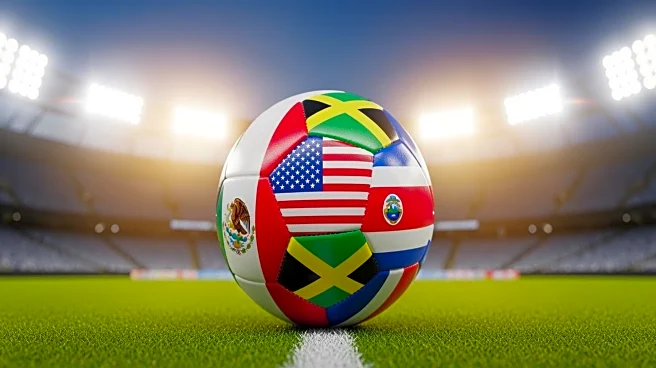What's Happening?
U.S. Soccer has announced a joint bid with Mexico, Jamaica, and Costa Rica to host the FIFA Women's World Cup in 2031. This bid marks a significant collaboration within the CONCACAF region, aiming to set
a new global standard for women's football. The announcement was made at a news conference in New York City, where U.S. Soccer President Cindy Parlow Cone expressed pride in leading the bid alongside CONCACAF partners. The 2031 tournament will be the first Women's World Cup to feature 48 teams, following FIFA's decision to expand from 32 teams. The U.S. has previously hosted the Women's World Cup in 1999 and 2003, and this bid is uncontested, with FIFA expected to ratify it at the FIFA Congress in Vancouver next year.
Why It's Important?
The joint bid for the 2031 Women's World Cup is significant as it represents a major step in promoting women's soccer globally, particularly in the CONCACAF region. Hosting the tournament is expected to draw an estimated 4.5 million fans across the four nations, providing substantial economic benefits and increased visibility for women's sports. The inclusion of Jamaica marks the first time a Caribbean nation will host a senior World Cup match, highlighting the growing influence and development of women's soccer in smaller nations. The expansion to 48 teams also reflects FIFA's commitment to growing the sport and increasing its commercial value, with a target of $1 billion in revenue for the tournament.
What's Next?
FIFA is expected to ratify the joint bid at the FIFA Congress in Vancouver next year. U.S. Soccer has indicated that more than 30 U.S. cities have expressed interest in hosting matches, with decisions on stadiums likely to be made by 2027. The focus will be on creating a memorable experience for players and fans, with Jamaica's inclusion seen as a significant milestone for the Caribbean region. The bid also aligns with FIFA's strategy to place major events in the U.S. due to its strong commercial value, despite previous controversies over ticket prices for the 2026 Men's World Cup.
Beyond the Headlines
The joint bid for the 2031 Women's World Cup could have long-term implications for the development of women's soccer in the CONCACAF region. It presents an opportunity to inspire a new generation of female athletes and fans, potentially leading to increased investment in women's sports infrastructure and programs. The collaboration among the U.S., Mexico, Jamaica, and Costa Rica may also strengthen regional ties and foster greater cooperation in sports development. Additionally, the expansion to 48 teams could encourage more countries to invest in their women's soccer programs, contributing to the global growth of the sport.









